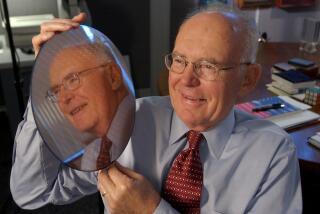An Wang; Founded Computer Company
- Share via
An Wang, the shy engineer from Shanghai who built a $600 investment into a multibillion dollar computer firm, died Saturday in Boston after a long battle with cancer. He was 70 and still chairman and chief executive officer of his Wang Laboratories.
Martin Bander, spokesman for Massachusetts General Hospital, said Wang had been admitted to the hospital March 6 because of a relapse. He was operated on last July 14 for esophageal cancer.
Although Wang Laboratories has suffered setbacks in the last few years and is now undergoing restructuring, it remains a monument to Wang, who began in 1951 with $600 and himself as the only employee. The company now has 38 U.S. district offices, and the billionaire Wang was listed by Forbes magazine as the fifth richest man in America.
“One of the pioneering giants of the computer industry has left us,” said Richard W. Miller, Wang president and chief operating officer. “Dr. Wang’s legacy is a life distinguished both as inventor and entrepreneur and as a good and decent man.”
Known to his employees as “The Doctor,” Wang held 40 patents and 23 honorary degrees, and is one of 69 members of the National Inventors Hall of Fame. In 1986, Wang was one of 12 naturalized citizens who received a Medal of Liberty awarded by President Ronald Reagan at the unveiling of the restored Statue of Liberty in New York.
Wang’s greatest scientific accomplishment is considered to be the invention of computer magnetic core memory in the 1940s, using a small doughnut-shaped iron ring. It provided computer memory until the microchip was developed two decades later.
He was named to the Hall of Fame because of his 1948 invention of the pulse transfer controlling devices that led to the development of commercial computers.
“It’s very satisfying to be listed right up there with the historical figures that were named in my textbooks in grammar school,” Wang said of the honor.
His company’s major growth began in 1964 when he marketed a desktop calculator and began developing office computers.
The son of a schoolteacher, Wang was born in Shanghai, China, Feb. 7, 1920. He earned his bachelor’s degree in engineering at Chiao Tung University in 1940 and taught there for a year, then worked as an engineer at the Central Radio Works in China until he came to America in 1945.
He obtained master’s and doctoral degrees in applied physics from Harvard University in 1948, and worked there as a research fellow until he founded his company in 1951. In 1955, he became a naturalized American citizen.
Wang married Lorraine Chiu on July 10, 1949, and the couple had three children--Frederick, who served as president of Wang Laboratories from 1986 until Miller replaced him for the restructuring, Courtney and Juliette. Bander said all four family members had regularly been at Wang’s bedside during his final illness.
Economists and Massachusetts Gov. Michael S. Dukakis credit Wang with saving the dying town of Lowell, 30 miles northwest of Boston, by locating his company headquarters there--including a free country club and day-care center for employees. Birthplace of the Industrial Revolution, Lowell had fallen on hard times when the nation’s textile industry moved to the South.
Considered Boston’s most generous philanthropist, Wang in recent years donated $4 million for the Wang Center for the Performing Arts in Boston, $4 million to Harvard, $1 million to Wellesley College, and $6 million to create Boston’s Wang Institute of Graduate Studies for software engineers and China scholars.
Wang credited Harvard with giving him his start in computer development in 1948 when he was a research fellow in its Computation Laboratory, and regularly demonstrated his gratitude with money.
A decisive man of few words, Wang once startled Harvard faculty Dean Henry Rosovsky, who had prepared a half-hour speech to solicit funds from the industrialist.
“But when we went in his office, he just said, ‘How do you do. I have decided to increase my gift,’ and he named a seven-figure sum,” Rosovsky said. “Then he didn’t want to hear our speech.”
Wang wrote an autobiography, “Lessons,” in 1986, which some reviewers considered a methodical account of the history of Wang Laboratories rather than of Wang himself. His shy, reticent style caused Inc. magazine to note:
“The saga of a Chinese immigrant who earns a Ph.D. in applied physics at Harvard, starts a company, and guides it onto the Fortune 500 ought to have made a great book. But Wang’s detached style--the written equivalent of a monotone--makes him sound bored with his own story.”






